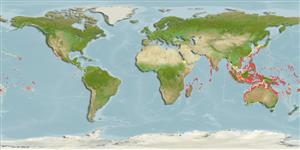>
Gobiiformes (Gobies) >
Gobiidae (Gobies) > Gobiinae
Etymology: Fusigobius: Latin, fusus = spindle + Latin, gobius = gudgeon (Ref. 45335); humeralis: Named for the black spot in the humeral region, the most distinct marking..
More on author: Randall.
Environment: milieu / climate zone / depth range / distribution range
Ecologia
marino demersale; distribuzione batimetrica 3 - 30 m (Ref. 54980). Tropical
Indo-Pacific: Red Sea to French Polynesia, north to the Ryukyu Islands, south to the Great Barrier Reef and New Caledonia.
Size / Peso / Age
Maturity: Lm ? range ? - ? cm
Max length : 4.4 cm SL maschio/sesso non determinato; (Ref. 54980); 3.2 cm SL (female)
Short description
Morfologia | Morfometria
Spine dorsali (totale): 7; Raggi dorsali molli (totale): 9; Spine anali 1; Raggi anali molli: 8; Vertebre: 26. Diagnosis: Dorsal rays VI - I,9. Anal rays 1,8. Pectoral rays 17-19 (usually 18). Longitudinal scale series 25. Head naked except for scales on side of nape reaching nearly to orbit. Posterior nostril near edge of orbit. Body depth 4.4-4.8 in SL; snout short, 3.4 - 3.7 in head. First dorsal fin not higher than second (longest dorsal soft ray longer than longest dorsal spine); second or third dorsal spines longest, 5.35-5.8 in SL. Pelvic fins fully joined medially by membrane (when intact); pelvic frenum present. Body translucent with numerous small dusky orange-yellow spots on head and body, those on head in oblique rows; a round black spot as large or larger than pupil in humeral region just above base of pectoral fin, and a second black spot of about the same size at mid base of caudal fin (Ref. 41649).
Inhabits sand-rubble bottoms next to reefs in 3-30 m (Ref. 90102).
Life cycle and mating behavior
Maturità | Riproduzione | Deposizione | Uova | Fecundity | Larve
Randall, J.E., 2001. Five new Indo-Pacific gobiid fishes of the genus Coryphopterus. Zool. Stud. 40(3):206-225. (Ref. 41649)
IUCN Red List Status (Ref. 130435)
Threat to humans
Harmless
Human uses
Informazioni ulteriori
Nomi ComuniSinonimiMetabolismoPredatoriEcotossicologiaRiproduzioneMaturitàDeposizioneSpawning aggregationFecundityUovaEgg development
Age/SizeAccrescimentoLength-weightLength-lengthLength-frequenciesMorfometriaMorfologiaLarveDinamica popolazioni larvaliReclutamentoAbbondanzaBRUVS
BibliografiaAcquacolturaProfilo di acquacolturaVarietàGeneticaElectrophoresesEreditarietàMalattieElaborazioneNutrientsMass conversion
CollaboratoriImmaginiStamps, Coins Misc.SuoniCiguateraVelocitàModalità di nuotoArea branchialeOtolithsCervelliVista
Strumenti
Special reports
Download XML
Fonti Internet
Estimates based on models
Preferred temperature (Ref.
123201): 24.7 - 29.3, mean 28.3 °C (based on 2802 cells).
Phylogenetic diversity index (Ref.
82804): PD
50 = 0.5005 [Uniqueness, from 0.5 = low to 2.0 = high].
Bayesian length-weight: a=0.01023 (0.00477 - 0.02194), b=3.02 (2.84 - 3.20), in cm total length, based on LWR estimates for this (Sub)family-body shape (Ref.
93245).
Trophic level (Ref.
69278): 3.2 ±0.3 se; based on size and trophs of closest relatives
Resilienza (Ref.
120179): Alto, tempo minimo di raddoppiamento della popolazione meno di 15 mesi (Preliminary K or Fecundity.).
Fishing Vulnerability (Ref.
59153): Low vulnerability (10 of 100).
